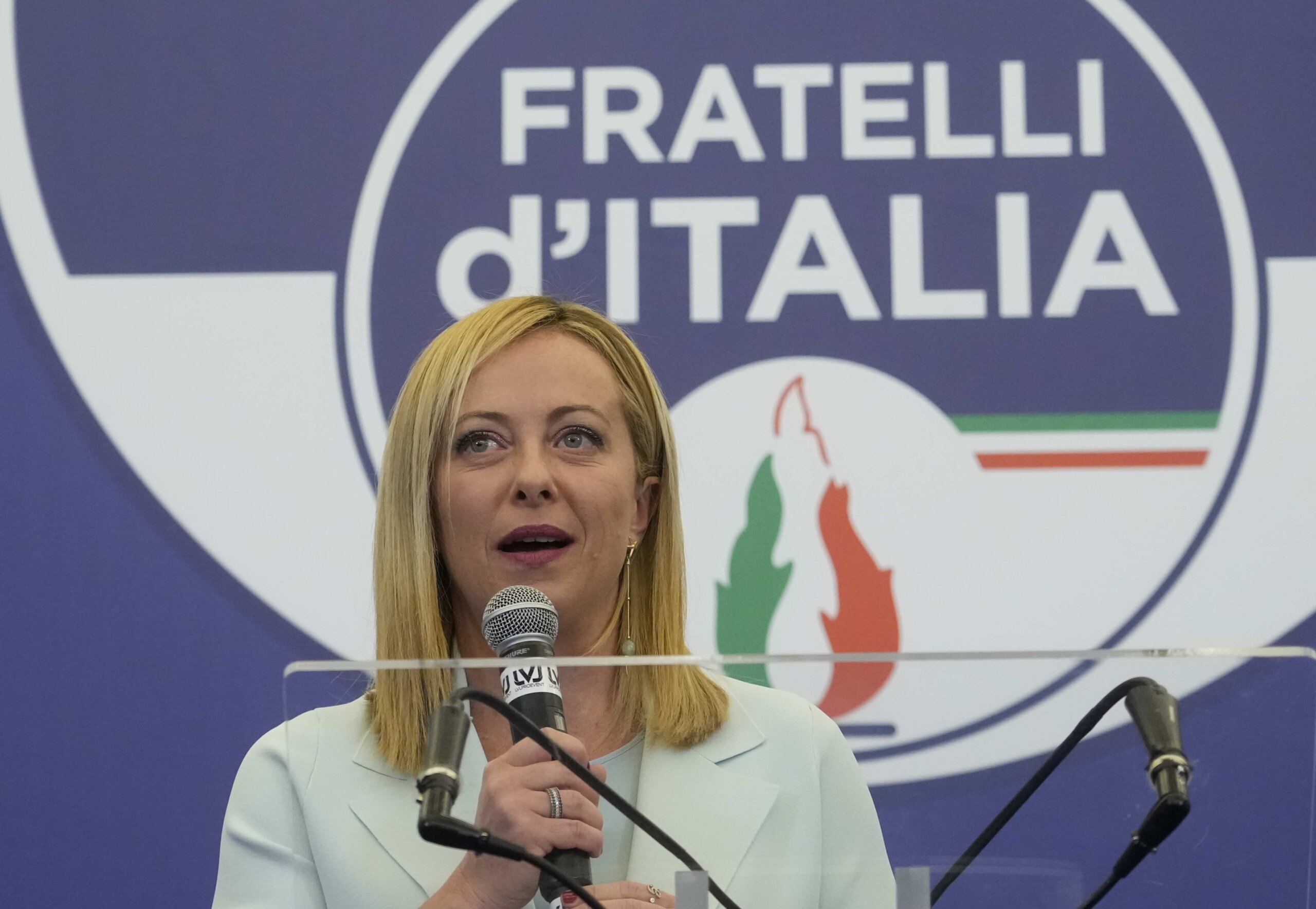After forming an alliance with other right-wing and centre-right parties, Italy’s far-right Brothers of Italy (Fratelli d’Italia) was catapulted to victory in a snap parliamentary election on September 25. Giorgia Meloni, Brothers of Italy’s founder and leader, is set to become prime minister later this fall. In an announcement following her victory, Meloni vowed to “govern for everyone.” But Meloni’s track record has advocates worried that her vision of “everyone” excludes Italy’s LGBTQ+ community.
“Ms. Meloni is obsessed with LGBTQ+ people, she constantly mentions them, holds speeches all over the world naming them. Then when we ask her about this obsession, she says there is nothing homophobic. She evidently also considers us unintelligent,” noted Arcigay, Italy’s largest LGBTQ+ rights organization, in a press statement earlier this month.
In a speech to Spain’s far-right Vox party earlier this year in Marbella, Meloni candidly outlined her political priorities: “Yes to the natural family, no to the LGBTQ+ lobby, yes to sexual identity, no to gender identity, yes to the culture of life, no to that of death.” What her promise precisely means is unclear, though Meloni campaigned on a stringent opposition to surrogacy and adoption by queer couples.
Meloni has a track record of opposing same-sex parenting rights, and stressing the importance of heterosexual families. In Italy, surrogacy and IVF are banned for non-heterosexual couples, and adoption requires marriage rather than civil union—effectively banning gay couples from adopting. Outside of microstate areas like Monaco and San Marino, gay couples cannot marry, though since 2016 they can form civil unions. In 2018, Meloni submitted an amendment to parliament that would extend the reach of the ban on surrogacy, barring Italians from even accessing the procedure abroad. Last year, Meloni campaigned on making surrogacy a “universal crime.”
Meloni’s opposition to gay parents is so severe that, earlier in September, her party attempted to have an episode of the children’s cartoon Peppa Pig censored in Italy. The episode in question featured a baby polar bear being parented by two mothers. In a statement, the Brothers of Italy’s culture spokesperson raged against the “unacceptable” episode, saying Italians “cannot accept gender indoctrination,” and that gay parenting should not be presented as something “natural or normal, because it’s not.”
Though Meloni claimed her party will not roll back what few rights exist for LGBTQ+ Italians, the Brothers of Italy did oppose the legalization of same-sex civil unions, voting against the motion in 2016.
Last year, the party also mobilized to block the passing of the “Zan” bill, which would have made homophobic or transphobic violence—among other things—hate crimes. On their website, the party explains that they opposed the bill specifically because of its promotion of “gender ideology”—a phrase generally used as a homophobic and transphobic dog whistle.
The previously fringe Brothers of Italy has long-standing fascist ties. It was born out of the ashes of the Italian Social Movement (MSI), a neo-fascist party created by Mussolini’s allies after the Second World War. Meloni herself has shown fondness for the dictator in the past, expressing her belief that he was a “good politician.” And while she purports to have shifted her views, her platform remains focused on nationalism, opposition to immigration and emphasizes the sanctity of the nuclear family.
Meloni’s election continues a trend of far-right political shifts across Europe, with governments in Hungary, Sweden and Poland rising to power on anti-LGBTQ+ platforms. The soon-to-be prime minister’s politics have been compared to Hungarian prime minister Viktor Orbán, who has claimed to be Hungary’s defender against “LGBTQ+ ideology,” and who in 2021 enacted a law banning showing LGBTQ+ material to minors. Hungary’s right-wing government appears thrilled at Meloni’s rise to power, with Orbán’s aide cheering the election of a friend “who shares a common vision and approach to Europe’s challenges.”
LGBTQ+ advocates are wary about the implications of Meloni’s win. “It’s very likely Meloni’s government won’t advance LGBTQ+ rights in any way, won’t approve any long-awaited laws such as the equal marriage law, or making homophobia and transphobia hate crimes,” Arcigay told Xtra in a statement via email. “In the long run, we cannot be sure what a far-right government might do. As the events in recent years in America have clearly shown, no democracy can be safe without a strong commitment to maintaining the constitutional values of a country.”
Advancing the standing of the LGBTQ+ community in the face of this far-right turn will be a challenge for a country that already lags behind its neighbours in even the most basic of protections for queer and trans Italians.


 Why you can trust Xtra
Why you can trust Xtra


